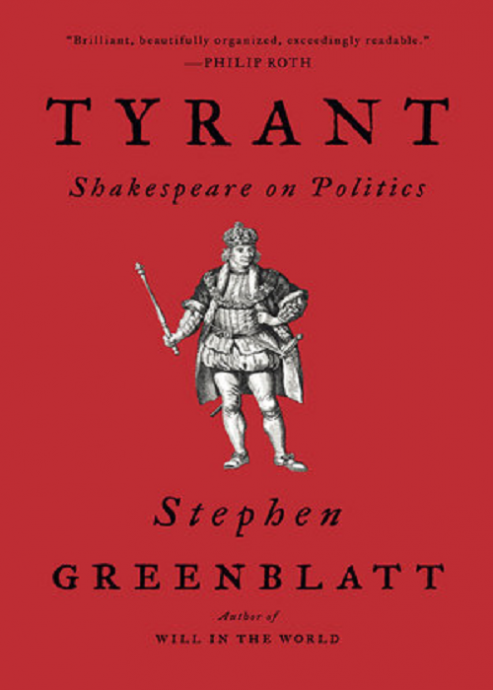Colin Dueck discusses his new book, Age of Iron, with Richard Reinsch
Was the Bard Writing about The Donald?
Political thinkers have long declared that a populace in a democratic republic must be leery of the nefarious designs of its most ambitious leaders, who would twist the political institutions of a free people and manipulate the citizens’ desires in an audacious attempt to attain sole rule—to turn a republic into a tyranny. Plato in his Republic has Socrates explain how the people, reveling in their protector’s redistribution of wealth, might accept complacently his call for armed guards against the “enemies” his solicitousness for the people has sown against him. In this way might the people unwittingly abet a tyrant’s rise to power.
The young Abraham Lincoln in his Lyceum Address of 1838 contemplates the difficulties the United States will face when the most ambitious of its citizens, those who also possess “the loftiest genius,” come to power. Such rare individuals, envious of the great glory of the Founders, and seeing no opportunity for themselves to be founders, will inevitably turn their attention to destruction.
“Towering genius,” says Lincoln, “disdains a beaten path” and cannot therefore be gratified in “maintaining an edifice that has been erected by others.” Such ambition “scorns to tread in the footsteps of any predecessor, however illustrious.” To meet the existential danger posed by this superior individual, “the people” must “be united with each other, attached to the government and laws, and generally intelligent, to successfully frustrate his designs,” he argues. Unlike Plato’s Socrates, Lincoln does think that democracy inevitably degenerates into tyranny; but in order to prevent that disease to which democracy is so susceptible, he warns that the populace must retain two things: its attachment to the rule of law, and the insights of its members that can only come from a clear-eyed education.
In Tyrant: Shakespeare on Politics, Stephen Greenblatt, the John Cogan University Professor of the Humanities at Harvard University, undertakes to use his deep knowledge and understanding of Shakespeare’s plays to further our understanding of tyranny. His apparent goals are to enlighten us as to our current situation—which he assesses as an age of a tyranny—and to fortify us to resist. Greenblatt speaks through the Bard’s histories and tragedies, among them the trilogy of Henry VI (whose authorship is contested), Richard III, King Lear, Macbeth, A Winter’s Tale, Julius Caesar, and Coriolanus.
In the first chapter, entitled “Oblique Angles,” Greenblatt notes that the playwright throughout his career treated the “deeply unsettling question” of how it is “possible for a whole country to fall into the hands of a tyrant.” Although William Shakespeare (1564-1616) lived in a tumultuous time in which treasonous plots flourished, justifying themselves by decrying the current regime as ungodly, unjust, and illegitimate, the plays maintained a studied distance from such contentious contemporary issues, Greenblatt observes. Nevertheless, he argues, Shakespeare’s audience members gleaned for themselves the plays’ meaning for their own personal and historical situations.
He refers, by way of example, to the fact that supporters of Robert Devereux, Earl of Essex, on the eve of his planned rebellion, commissioned the staging of Shakespeare’s Richard II, which depicts the overthrow of a negligent ruler. Queen Elizabeth I caught the reference when she reflected later: “I am Richard II; know ye not that?” Greenblatt concludes from this historical anecdote that “it is the theater—Shakespeare’s theater—that offered the key to understanding the crisis of the present.”
This is the very historical fact to which the author pointed much earlier in his scholarly career, in his introduction to The Power of Forms (1982), when offering an explication of his theoretical approach to literature. Before Greenblatt wrote for popular audiences with this present book, and with The Swerve: How the World Became Modern (2011), and Will in the World: How Shakespeare Became Shakespeare (2004); before he won the Pulitzer Prize and the National Book Award; and before he became the general editor of The Norton Shakespeare, he was the leading light in the United States of the New Historicism. This movement brought a new historical approach to interpreting literature. Its theorists emphasize the degree to which the meaning of a literary work reflects cultural and historical forces. Greenblatt terms his particular approach “poetics of culture” and highlights the “collective social constructions” that texts inspire.
Just as Shakespeare’s contemporaries found significance in his plays for their time, so can we for ours, and that is precisely what Greenblatt intends to show us. Although the name Donald Trump appears nowhere in Tyrant, as far as this reader can ascertain, Greenblatt’s commentary, in fact, displays to its readers the many tragedies of Trump. Never before have the words narcissist and narcissism appeared so frequently in a book about Shakespeare.
A paragraph of commentary concerning the defects of the ruler of Sicilia, Leontes, in The Winter’s Tale reads, in its entirety:
A tyrant does not need to traffic in facts or supply evidence. He expects his accusation to be enough. If he says that someone has been betraying him, or laughing at him, or spying on him, it must be the case. Anyone who contradicts him is either a liar or an idiot. The last thing the tyrant wants, even when he appears to solicit it, is an independent opinion. What he actually wants is loyalty, and by loyalty he does not mean integrity, honor, or responsibility. He means an immediate, unreserved confirmation of his own views and a willingness to carry out his orders without hesitation. When an autocratic, paranoid, narcissistic ruler sits down with a civil servant and asks for loyalty, the state is in danger.
Of course, Greenblatt here speaks not of King Leontes but rather of President Trump and his now notorious meeting with James Comey, then the director of the Federal Bureau of Investigation (whose memoir about his travails with Trump was reviewed in these pages by Charlotte Allen).
Similarly, in addressing the character of Richard III—but in a paragraph in which, again, no proper noun appears—Greenblatt remarks that “his possession of power includes the domination of women” and that “sexual conquest excites him, but only for the endlessly reiterated proof that he can have anything he likes. He knows that those he grabs hate him.” No reader can doubt that he speaks here not only of Richard. Perhaps he intends to enlighten us on the tyrant writ large, but more narrowly his phrasing calls to mind the Access Hollywood tape of Trump’s licentious musings that surfaced during the presidential campaign.
Greenblatt brings to a popular audience the enduring significance of Shakespeare and calls upon a free people to take their liberty seriously. These are praiseworthy intentions for an illustrious scholar. It is perhaps, then, when it comes to the book’s subtitle, “Shakespeare on Politics,” that a commentator can take issue with him. There are more things in Shakespeare’s politics—in the playwright’s heaven and earth—than Trump. By approaching Shakespeare in this reductionist way, one risks missing the greatest lessons of his multifaceted and penetrating depictions of politics.
Indeed, the author himself acknowledges that Macbeth’s soul-rending self-understanding and guilt are “difficult to picture” in “the tyrants of our own times.” Moreover, the spectacular martial greatness of Coriolanus and that warrior’s inchoate longing for a transcendent autonomy point more toward the towering and loftiest individuals of whom Lincoln warned than to the star of a reality television show, no matter how noxious his deeds may ultimately prove to our republican order.


